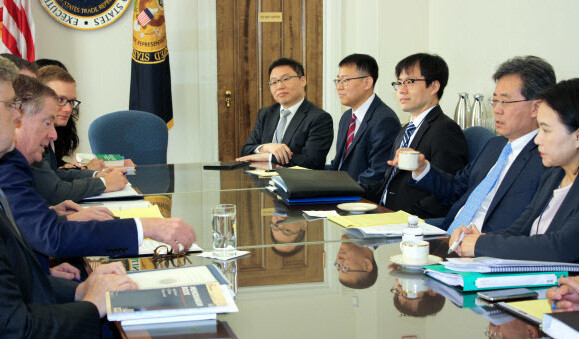hankyoreh
Links to other country sites 다른 나라 사이트 링크
[Editorial] SK government should refuse further concessions in agricultural industry

The South Korean government is reportedly considering further opening of the agricultural sector as one of the possible scenarios in the negotiations aimed at revising the Korea-US Free Trade Agreement (KORUS FTA). This contradicts the government’s repeated statements that there will be no more concessions in agriculture.
According to a report in the Hankyoreh, one of the “highly realistic” negotiation scenarios being considered in a report reviewing the economic feasibility of revising the KORUS FTA (which is being jointly prepared by the Korea Institute for International Economic Policy (KIEP) and other government-funded research institutes) is further opening up farm products other than rice. This plan would speed up the timeframe for cutting tariffs on 176 agricultural products – including beef, pork, chicken, tangerines and grapes – or to gradually expand the amount of opening. The government is planning to release this report during a public hearing for revising the KORUS FTA that will be held on Nov. 10.
Thus far, the government has always dismissed the possibility of additional opening of agricultural products whenever this idea was mentioned. “Agriculture is our red line. We have told the US that if it touches agriculture, we’ll have no choice but to mess with the subjects that are the most sensitive for the US,” said South Korean Trade Minister Kim Hyun-chong on Oct. 13. This made clear that even if the US brought up agriculture as leverage in the negotiations, South Korea would absolutely not accept this. And on Oct. 30, Kim Yung-rok, Minister of Agriculture, Food and Rural Affairs, bluntly stated that “there are no more concessions to make in the agriculture sector.”
When an agreement was reached on the FTA in 2012, farmers made many concessions for the good of the entire national economy, and as a result they have suffered considerable losses over the past five years. While South Korea’s surplus in its trade balance with the US has doubled during that period, from US$11.6 billion in 2011 to US$23.3 billion won in 2016, the amount of the agro-livestock deficit has actually increased from US$5.9 billion to US$6.5 billion. Because the beef market was significantly opened up to ease the passage of the KORUS FTA, the production base of South Korea’s cattle farmers is on the verge of collapsing. Increasing imports of US-produced fruit such as oranges, cherries and lemons is inflicting serious losses on South Korean orchard owners as well. Additional opening of the sector is sure to expand the scope of damage.
Throughout the course of the negotiations so far, the South Korean government has been constantly pushed around by the US. It has been on the defensive, likely because it was intimidated by US President Donald Trump’s threat to withdraw from the KORUS FTA. But studies by some research institutes both inside and outside of South Korea show that the US has more to lose by leaving the agreement. The only way to defend the national interest is to approach the negotiations by boldly refusing to accept any unreasonable demands.
Please direct questions or comments to [english@hani.co.kr]

Editorial・opinion
![[Column] Park Geun-hye déjà vu in Yoon Suk-yeol [Column] Park Geun-hye déjà vu in Yoon Suk-yeol](https://flexible.img.hani.co.kr/flexible/normal/500/300/imgdb/original/2024/0424/651713945113788.jpg) [Column] Park Geun-hye déjà vu in Yoon Suk-yeol
[Column] Park Geun-hye déjà vu in Yoon Suk-yeol![[Editorial] New weight of N. Korea’s nuclear threats makes dialogue all the more urgent [Editorial] New weight of N. Korea’s nuclear threats makes dialogue all the more urgent](https://flexible.img.hani.co.kr/flexible/normal/500/300/imgdb/original/2024/0424/7317139454662664.jpg) [Editorial] New weight of N. Korea’s nuclear threats makes dialogue all the more urgent
[Editorial] New weight of N. Korea’s nuclear threats makes dialogue all the more urgent- [Guest essay] The real reason Korea’s new right wants to dub Rhee a founding father
- [Column] ‘Choson’: Is it time we start referring to N. Korea in its own terms?
- [Editorial] Japan’s rewriting of history with Korea has gone too far
- [Column] The president’s questionable capacity for dialogue
- [Column] Are chaebol firms just pizza pies for families to divvy up as they please?
- [Column] Has Korea, too, crossed the Rubicon on China?
- [Correspondent’s column] In Japan’s alliance with US, echoes of its past alliances with UK
- [Editorial] Does Yoon think the Korean public is wrong?
Most viewed articles
- 1[Column] Park Geun-hye déjà vu in Yoon Suk-yeol
- 2Will NewJeans end up collateral damage in internal feud at K-pop juggernaut Hybe?
- 3N. Korean hackers breached 10 defense contractors in South for months, police say
- 4Thursday to mark start of resignations by senior doctors amid standoff with government
- 5[Guest essay] The real reason Korea’s new right wants to dub Rhee a founding father
- 6Kim Jong-un expressed ‘satisfaction’ with nuclear counterstrike drill directed at South
- 7Up-and-coming Indonesian group StarBe spills what it learned during K-pop training in Seoul
- 8Why Korea shouldn’t welcome Japan’s newly beefed up defense cooperation with US
- 9Opposition calls Yoon’s chief of staff appointment a ‘slap in the face’
- 10Terry Anderson, AP reporter who informed world of massacre in Gwangju, dies at 76